
“Murti Chor” Episode: A Riveting Exploration of Faith and Tradition
“Murti Chor” Episode: A Riveting Exploration of Faith and Tradition
The popular Indian TV series Jay Jagannath has captivated audiences with its rich portrayal of the spiritual and cultural heritage of India. Among the numerous episodes, “Murti Chor” stands out as a compelling narrative that delves into themes of faith, devotion, and the sanctity of religious artifacts. The episode, which translates to “The Idol Thief,” is a dramatic exploration of the consequences when sacred objects are mishandled, reflecting the profound reverence that Hindu culture places on religious idols.
The Premise
“Murti Chor” begins with a crisis in the temple of Lord Jagannath, one of the most revered deities in Hinduism. The episode opens with the shocking discovery that the sacred idol of Lord Jagannath has been stolen. The temple authorities, as well as the devotees, are thrown into a state of panic and despair. The missing idol is not just a religious artifact but a symbol of divine presence and protection for the community. This theft is more than a criminal act; it is a violation of faith and a source of spiritual turmoil for the believers.

The Cultural Significance of the Idol
In Hinduism, idols are not mere representations but are believed to be imbued with the essence of the deity they depict. The stolen idol of Lord Jagannath is central to the temple’s rituals and to the spiritual well-being of the devotees. Its theft is seen as an ominous event, with the potential to bring misfortune and disrupt the balance of the divine order. The episode effectively captures the cultural and religious importance of the idol, emphasizing that it is not just an object, but a vessel of divine energy and a focal point of worship.
The Search for the Thief
The narrative then shifts to the efforts to recover the stolen idol. The temple priests, along with the local authorities, embark on a frantic search for the thief. The investigation is not merely a matter of law enforcement but is also a quest to restore spiritual harmony. The episode weaves together elements of mystery and suspense, as the characters follow clues and confront suspects. The search is depicted as a test of faith, where the true devotion of the characters is revealed.
Moral and Spiritual Lessons
As the plot unfolds, the episode delves deeper into the motives behind the theft. It is eventually revealed that the thief is a man who has fallen on hard times and believes that stealing the idol will bring him wealth and good fortune. However, the episode takes a poignant turn when the thief experiences a spiritual awakening. He realizes that his act of theft has not brought him any material gain but has instead filled him with guilt and fear. This realization is a critical moment in the narrative, highlighting the futility of seeking material benefits through immoral means.
The thief’s journey towards redemption is a central theme in the episode. He is portrayed as a misguided soul who, through the grace of Lord Jagannath, comes to understand the true meaning of devotion and the importance of righteousness. The episode concludes with the thief returning the idol to the temple, seeking forgiveness from the deity and the community. This act of repentance is met with compassion, as the temple priests and the devotees recognize his genuine remorse.
Conclusion
“Murti Chor” is a powerful episode that resonates with viewers on multiple levels. It is not just a story about the theft of an idol, but a deeper exploration of faith, morality, and the redemptive power of spirituality. The episode reflects the values of compassion, forgiveness, and the belief that no one is beyond redemption. Through its engaging narrative and strong moral message, “Murti Chor” reinforces the significance of religious traditions and the enduring power of faith in the face of adversity.
In essence, this episode of Jay Jagannath serves as a reminder that the divine is always watching, and that true devotion lies not in material possessions, but in the purity of one’s heart and actions.


Leave a reply here
Your email address will not be published. Required fields are marked *